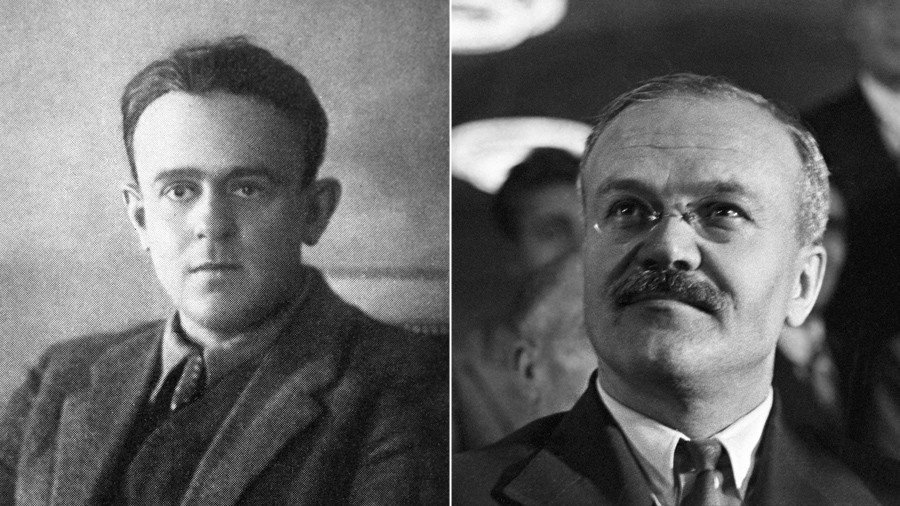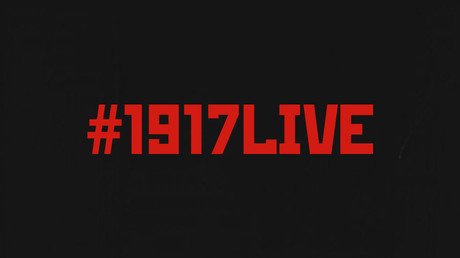#1917LIVE: John Reed & Vyacheslav Molotov – the project’s most active figures

As our #1917LIVE reenactment of the Russian Revolution draws to a close, we give a massive thank you to all our Twitter characters for taking part - including top tweeters John Reed and Vyacheslav Molotov.
Vyacheslav Molotov is a figure of immense importance to Soviet history. A key moment for the Old Bolshevik was the signing of the Molotov-Ribbentrop pact of 1939 with Nazi Germany. The young Stalin protégé rose through the ranks in the 1920s to become chairman of the Council of People’s Commissars, followed by the minister of foreign affairs post (1939-1949, and again in 1953-1956), as well as serving as first deputy premier (1942-1957). He is remembered by history as a man of impeccable diplomatic skills.
We Bolsheviks repeat our call : workers of Petrograd, unite and join the general strike! #1917LIVE
— VM Molotov (@Molotov_1917) March 3, 2017
As part of the #1917CROWD, Molotov is still young. He served as editor of Pravda – Vladimir Lenin’s key media vehicle – and was a member of the Petrograd Committee of the RSDLP (the Bolsheviks) and the Military-Revolutionary Committee (MRC).
Big announcement coming later today about new anti-sabotage commission, to be headed by Felix Dz. Stay tuned!#1917LIVE
— VM Molotov (@Molotov_1917) December 20, 2017
With 2,791 followers and nearly the same number of tweets, VM Molotov has RT’s undying gratitude for the immense contribution he has made to the project.
Time to show The Ukrainian bourgeoisie that we are serious about Soviet power!#1917LIVEhttps://t.co/ACqPjjclL9
— VM Molotov (@Molotov_1917) December 19, 2017
Following Molotov closely in number of followers (2,472), but far out-tweeting him with more than 5,000 tweets, is John S. Reed, the community’s American journalist – a Marxist and a Bolshevik, as well as a Soviet hero – born in Portland.
If only Americans would do the same about the conscription act. #StopTheWar#NoDraft#WoodrowWilson#1917LIVE#1917CROWDhttps://t.co/laI7tbCfe0
— John S. Reed (@JohnReed_1917) March 5, 2017
The American journalist rose to prominence with his coverage of the Russian Revolution. Reed had arrived to Petrograd in the aftermath of the failed coup by General Lavr Kornilov (then supreme commander of the Russian Army).
The bloody; failed, coup leader & Military “General” @GenKornilov1917; joining hands with @GenAlexeev_1917 to kill Proletarians of Russia, and suffocate the Revolution with the Tzars pillow. #1917LIVEhttps://t.co/8zfkQaP8of
— John S. Reed (@JohnReed_1917) December 19, 2017
A supporter of US President Woodrow Wilson’s push not to enter America into the war, Reed had become a sidelined figure in his own country. When on April 2, 1917, the president proclaimed that the United States would enter the war, Reed famously said at a People’s Council meeting in Washington: “This is not my war, and I will not support it. This is not my war, and I will have nothing to do with it.”
The Red Cross; despite what good done on an individual level, is little more than a capitalist tool for war. Heals those wounded, only to send them to the front to die. If this @RedCross had any integrity, it would be against the war entirely. @EugeneDebs1917#1917CROWD#1917LIVEhttps://t.co/1c5aaSgunL
— John S. Reed (@JohnReed_1917) December 19, 2017
Reed became an avid supporter of the socialist policies proposed by the Bolsheviks. This was October, so the mood was ripe for another revolution. Reed witnessed the Provisional Government of Alexander Kerensky shut down the bolshevist press and carry out its crackdowns on Lenin’s pro-worker and anti-war camp.
Revolutions by nature, can not be free from the harshness of birthing a liberated proletarian world. The capitalist system; itself, will not permit such a peaceful change. On capitals head, lay any blame of excess. #1917LIVE#1917CROWDhttps://t.co/4MyYQMyx6m
— John S. Reed (@JohnReed_1917) December 19, 2017
He was invited into the intimate circles of the new post-Kerensky government, assisting it on a great number of matters, and even met Leon Trotsky. In January 1918, Lenin’s ‘top Bolshevik’ will offer Reed the position of Soviet consul in New York, owing to the fact that the United States would for a time not recognize the new Bolshevik government.
Great Thanks to the Soviets Peace Negotiators; especially comrade @LeoTrotsky_1917. Despite the difficulty, Peace is its own reward. #EndTheWar#1917LIVE#1917CROWDpic.twitter.com/wumA7t4fmi
— John S. Reed (@JohnReed_1917) December 19, 2017
A great many pro-Soviet writings were penned by Reed, as he and his wife – political activist and journalist Louise Bryant – tried to win over the American public and turn change its relationship to the new Russia, which exited the war.
Reed will die in Moscow in 1920, with his wife close by his side.














